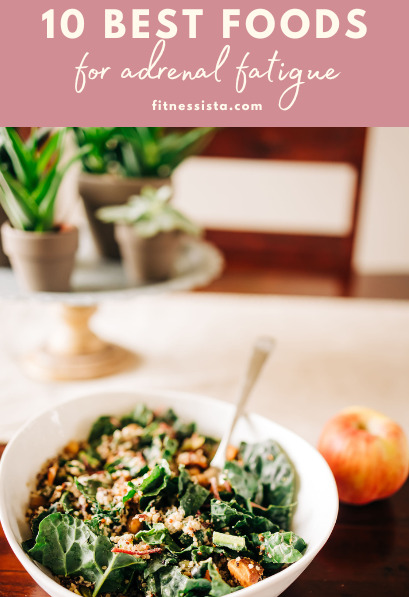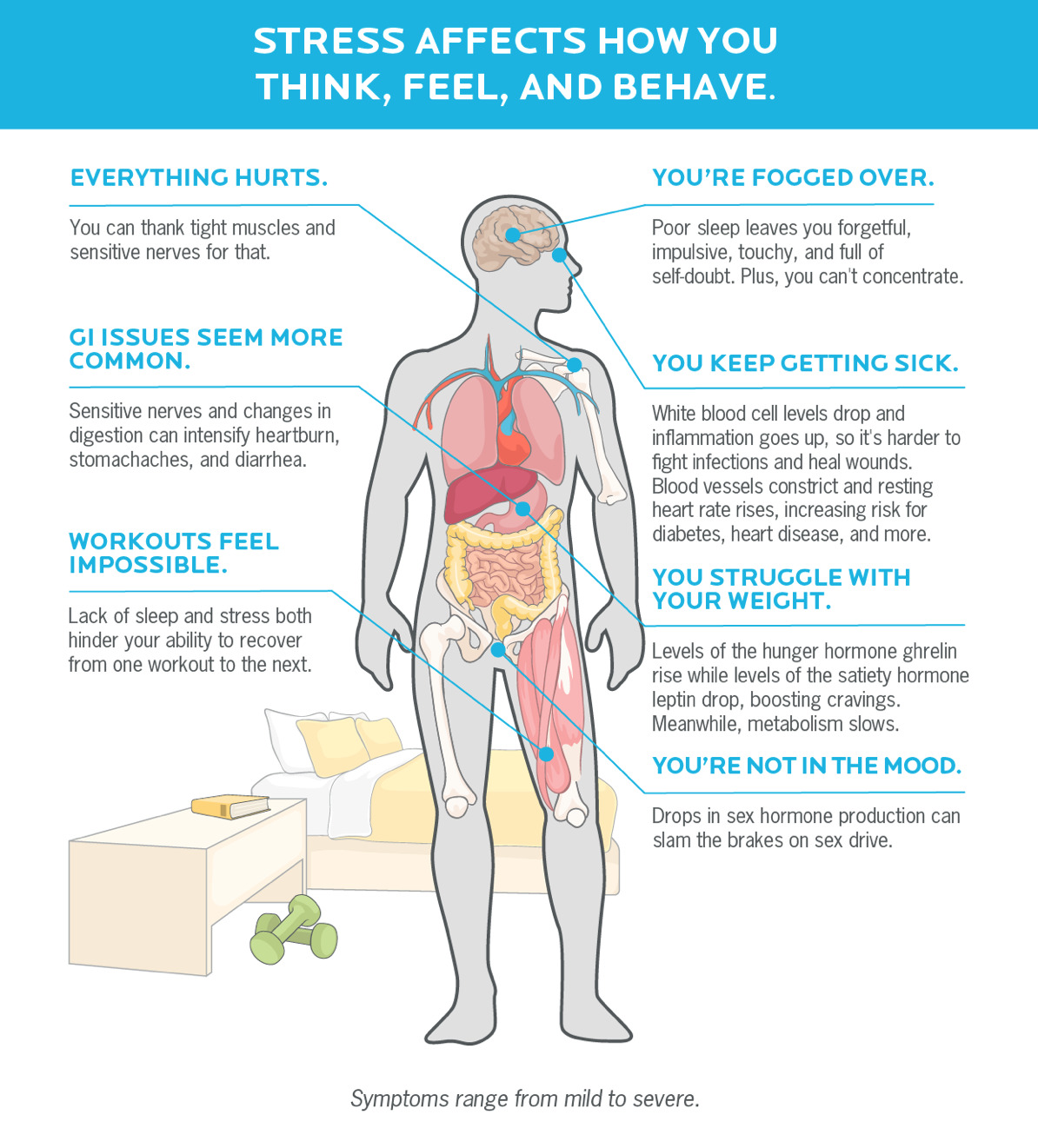
Hi friends! You’ve probably heard about adrenal fatigue, but may be wondering what the heck it is, and what to do if you suspect you have adrenal fatigue. Please keep in mind that this post is NOT medical information and not intended to substitute the advice of your medical professionals. It’s not intended to treat, cure, diagnose or prevent any medical conditions, and is simply for information purposes.
Hi friends! How’s the day going so far? I hope you’re having a great one! Today, I wanted to chat a bit about adrenal fatigue. It’s a huge topic and something that’s near to my heart because I suffered from chronic stress for many years. I couldn’t figure out why my hair was falling out, I was exhausted all of the time, and my hormones were out of whack. A huge contributing factor: stress. Stress affects so many processes and systems in the body and can take its toll.
What is adrenal fatigue?
There’s some debate about adrenal fatigue (more below), but it’s something that affects a lot of women, which can lead to hormone imbalances and poor health. Adrenal fatigue can occur when you are under chronic fatigue for a sustained amount of time.
Your adrenal glands sit on top of your kidneys (like a lil hat), and produce a variety of hormones, including cortisol. Cortisol is our “get up and go” hormone, which helps us to wake up in the morning, respond to stressors, and take action. Cortisol is often blamed for a lot of things, but it can actually be a good thing when it’s secreted in the appropriate times.
When you’re under chronic stress, it can deplete the adrenal glands’ ability to produce cortisol. This is why high cortisol eventually becomes low cortisol; the adrenals can no longer keep up with the demand and burn out. It can also cause them to produce cortisol in the inappropriate times, like late at night (which can lead to feeling “tired and wired” before bed) or in the middle of the night (when you wake up in a panic or stressed and can’t go back to sleep).
It can lead to symptoms that include:
– Poor mood
– Fatigue
– Brain fog
– Sugar or salt cravings
– Poor healing and recovery from illness and workouts
– Sleep disturbances
– Inability to fall asleep
and so much more.
You may hear people say that adrenal fatigue isn’t real because it isn’t thoroughly backed by science. But, there’s a huge problem with people feeling constantly stressed and exhausted. There’s also a chance that the things you’re experiencing could be due to HPA axis dysfunction: when the signals between your brain, pituitary gland, and adrenals get mixed up due to chronic stress.
Even if the adrenals are functioning properly and you’re under a huge amount of stress that’s affecting your daily life, it’s worth it making some lifestyle changes that can help your body deal with the chronic stress.
Your body under stress:
Here are some of my favorite powerhouse foods that can be nourishing and calming during stressful times.
10 best foods for adrenal fatigue
(or even for friends who know they need extra nutrients)
1) Broccoli and leafy greens
Broccoli is high in fiber and can also help to sweep excess estrogen to be digested instead of stored in the body. Greens like spinach, kale, and collard greens are high in magnesium, a mineral that is essential for adrenal health. Magnesium helps regulate the stress hormone cortisol and can also improve sleep quality. Kale, spinach, and Swiss chard are all excellent options.
2) Fatty Fish
Salmon, tuna, and sardines are rich in omega-3 fatty acids, which have been shown to lower inflammation and improve mood. These fatty acids also support healthy brain function, which can help alleviate anxiety and stress.
3) Sweet potatoes and other squashes
Sweet potato can support healthy progesterone levels and many women are not eating enough carbs. Carbs are the body’s preferred source of energy, and a sweet potato is nutrient-dense and tastes like a warm hug with cinnamon and a little peanut butter on top.
4) Olive oil and other healthy fats can help reduce inflammation
Stress is inflammatory on the body so healthy fats can help bring everything back to balance.
5) Beef liver and other organ meats
Don’t let organ meats freak you out! Check out this post.
Organ meats, such as liver, kidney, and heart, are some of the most nutrient-dense foods on the planet. They are packed with vitamins, minerals, and other essential nutrients that our bodies need to function properly. ne of the key nutrients that organ meats contain is vitamin B12, which is essential for healthy adrenal function. Vitamin B12 is also important for energy production and helps to reduce feelings of fatigue and weakness.
Organ meats are also a rich source of iron, which is critical for the production of hemoglobin, the protein in red blood cells that carries oxygen throughout the body. Iron deficiency is a common cause of fatigue and weakness, so consuming organ meats can help to prevent and treat this condition.
In addition to vitamin B12 and iron, organ meats are also high in other important nutrients, such as zinc, selenium, and vitamin A. These nutrients help to support a healthy immune system, improve brain function, and promote healthy skin and eyes
6) Adaptogens, like reishi mushroom, ashwaghanda and rhodiola
My faaave is this Gold powder (use code FITNESSISTA) mixed with warm almond milk before bed.
7) Artichoke
This is a superfood for your liver. Toxins are stressors on the body and liver support can help ensure your body is processing everything adequately.
8) Bone broth can help support a healthy gut which can be impacted by stress
Also high in nutrients and protein!
9) Oysters
A superfood! We love the canned smoked ones. They’re high in copper, selenium, B12, and Zinc.
10) Fruit, especially berries and apples
These can also be helpful in times of stress because it signals to the body that it’s getting nourishing carbs and can relax! Berries like blueberries, raspberries, and strawberries are high in antioxidants, which can protect the body from oxidative stress caused by chronic stress.
Some other things that can help with adrenal fatigue or general stress:
– Therapy and regular connection with those you love.
This can help bring the body back to the parasympathetic system (rest and digest), decrease cortisol, and increase our feel-good neurotransmitters
– Blood sugar balance.
The more I learn about blood sugar balance, it’s importance jumps further up my personal priority ladder. Check out the books Why We Get Sick and Glucose Revolution.
– Adrenal support.
There are various supplements that can help with adrenal support. Talk to your doctor or practitioner, but this is one of my faves.
– Decreasing workout frequency and intensity.
I recommend strength training and walking to all of my female 1:1 clients. If you’re looking for a balanced fitness plan based on phased strategies to get you the best results, check out Fit Team.
– Daily sunlight for Vitamin D, can help with sleep regulation, and a mood boost 🙂
– Nutritional strategies!
Here are some strategies I like to emphasize:
Increase intake of leafy, green veggies and cruciferous vegetables
Protein! Make sure you’re getting enough protein and try to aim for around 4 palm-sized servings per day. Gradually build up your protein intake so you don’t feel discouraged. If you’re not tracking, there’s a good chance you’re not hitting your protein goals. Also, try to add in organic turkey which contains tryptophan; it’s a precursor to serotonin, which is a feel-good neurotransmitter.
Try an adrenal cocktail. Here’s a post about adrenal cocktails and how to use them.
Prioritize sleep. Tips for sleep are in this post!
Organ meats. Again, don’t let these freak you out and remember that a little goes a long way.
Foods to avoid: It’s important to avoid processed and sugary foods, as well as caffeine and alcohol, which can all exacerbate adrenal fatigue. It’s also important to stay hydrated and get plenty of rest and exercise to support overall health and reduce stress levels.
Magnesium
Magnesium can be calming for the brain, especially if you go for magnesium glycinate or magnesium l-threonate. I also enjoy this topical magnesium and use it each night. Stress can deplete the body of minerals, so I like to make sure I’m getting enough minerals in my day through mineral drops and supplements.
Lately, I’ve had a lot of requests for 1:1 coaching – I love that everyone is so focused on their health for the spring and summer! – and have 3 spots remaining. If you’ve been curious about working with me, you can apply here.
Have a wonderful day and I’ll see ya soon!
xo
Gina
The post Best foods for adrenal fatigue appeared first on The Fitnessista.




.jpg)



0 comments: